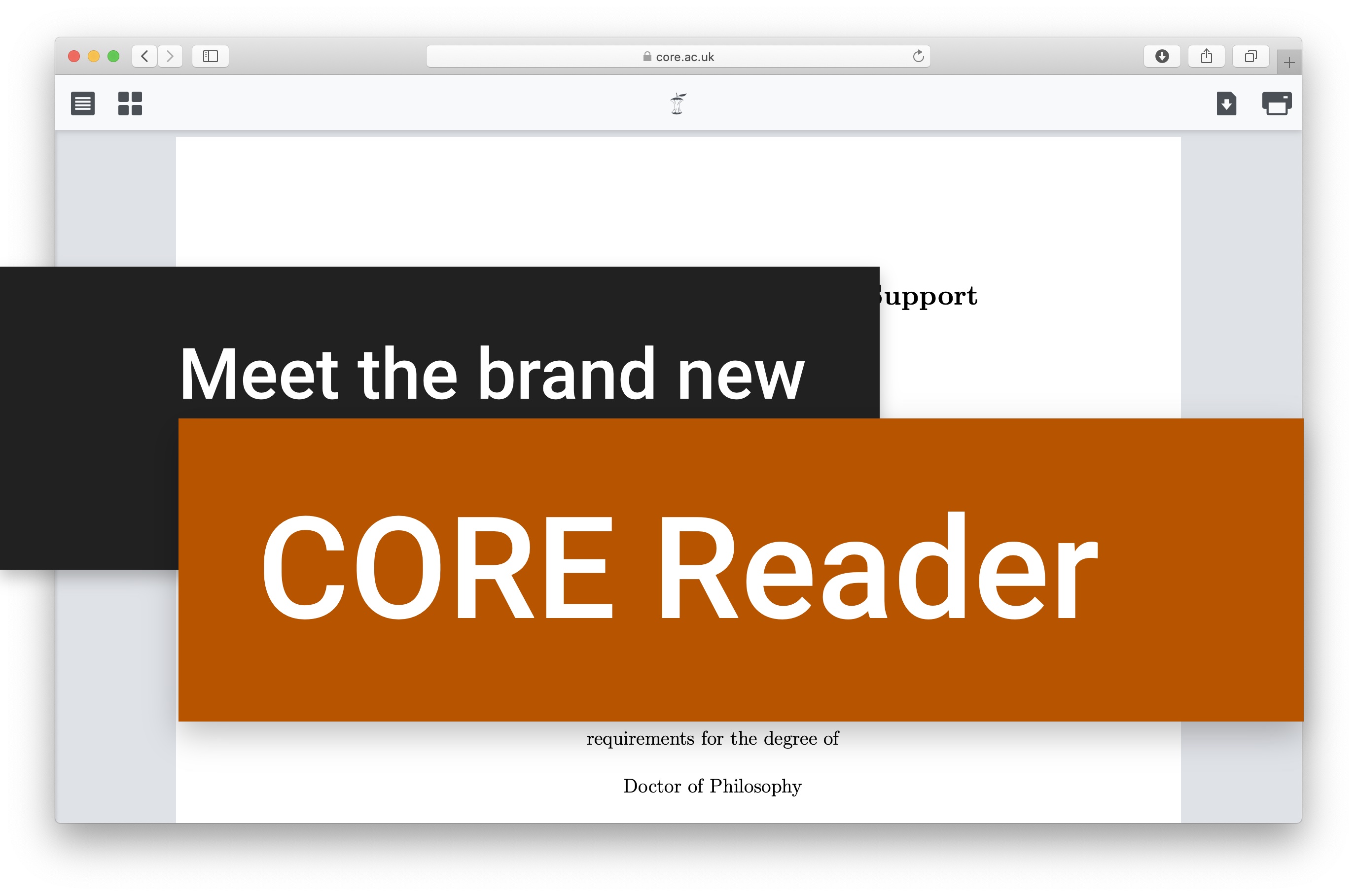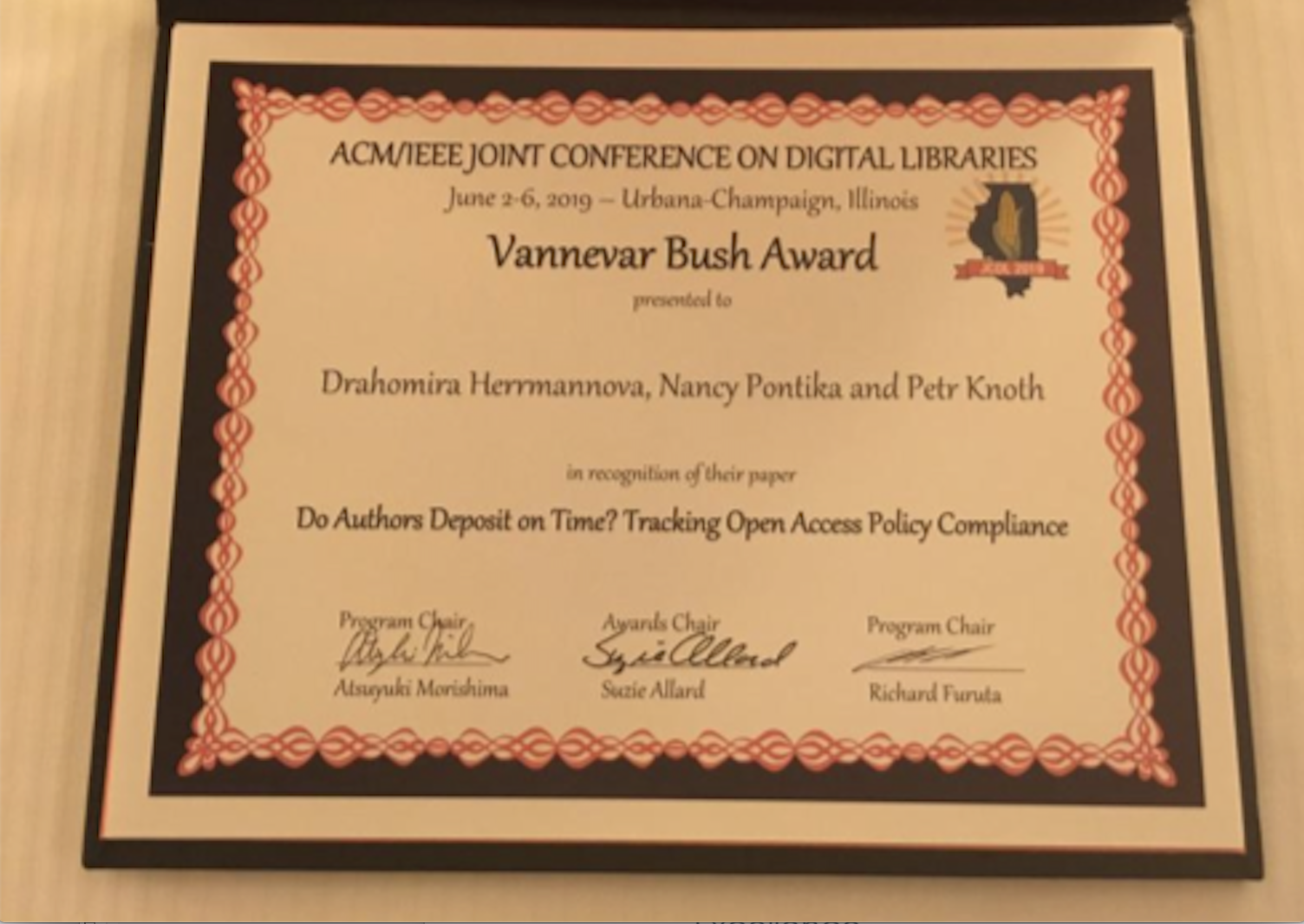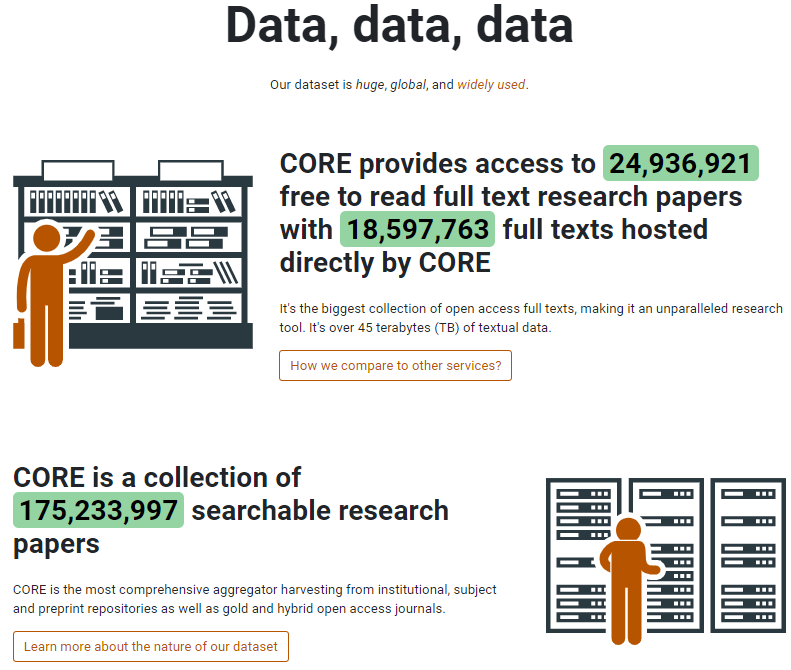Author: CORE Admin
Are you an iOS user? Access scientific articles in your device without hitting a paywall
Another year has passed and left a lot of good news, investigations and developments for CORE. Today we would like to tell you about one of them – Open Access (OA) Helper, an application developed for iOS mobile devices by Claus Wolf. We asked Claus to tell us how he came up with the OA Helper and here is what he answered.
When, where and why did you decide to develop OA Helper app?
In October 2018, I learned about how open access discovery services connect users to legal Open Access copies of otherwise paywalled articles. The available plugins weren’t available for Safari, my preferred browser, so I decided to give creating one a try.
CORE update for October to December 2019
During the last quarter of 2019 CORE released new updates for two of its services, CORE Reader and CORE Discovery, and has initiated new collaborations, for example with LA Referencia. In addition, CORE was singled out for its contributions and was awarded for its outstanding impact of research on society and prosperity. Details about these and more news can be found below.
CORE won an Outstanding Impact of Research on Society and Prosperity Award

During the Research Excellence Awards 2019 Ceremony dedicated to the 50th anniversary of The Open University, CORE was presented with the award for “Outstanding Impact of Research on Society and Prosperity Award”. This important award reflects the clear value CORE represents to its millions of users as the largest repository of Open Access scientific knowledge.
CORE users can now read articles directly on our site
We are happy to announce the release of CORE Reader, which provides a seamless experience for users wishing to read papers hosted by CORE. In this post, we provide an overview of what is new and we encourage you to follow this development as new functionalities in the reader are on our roadmap.

At the beginning of this project, there was a reflection that most open access services do not yet provide a rich user experience for reading research papers. Determined to change this, we originally started looking at whether CORE could render research papers as HTML, as has recently become trendy across publisher platforms. While such rendering remains to be one of the ultimate goals, we realised that this could only be achieved for a small fraction of documents in CORE. More specifically, those that the data provider offers in machine readable formats, such as LaTeX or JATS XML. While we want to encourage more repositories to support such formats (and this remains to be a Plan S recommendation), we wanted to improve the reading experience for all of our users across all of our content.
CORE welcomes Plan S
CORE welcomes the objectives of Plan S to advance openness in all research subject fields as described in its ten principles. Plan S, which was initiated by a coalition of 11 European research funders aims to further the adoption of open access to European funded research.

September 2018 saw the launch of Plan S, an initiative supported by the European Commission and various national public funding bodies (“cOAlitionS”) who, from 2020, will require that all articles by their grantees must be published immediately OA. The policy aims to accelerate the transition to OA with 10 principles and builds on an implementation guideline that aims to articulate a comprehensive operational roadmap for all stakeholders: funders, repositories, publishers and learned societies. A revised guideline, following a public consultation, is due in May 2019.
Releasing a new CORE Discovery browser extension
 CORE Discovery helps users find freely accessible copies of research papers that might be behind a paywall on the publisher’s website. It is backed by our huge dataset of millions of full text open access papers as well as content from widely used external services beyond CORE. The tool not only provides state-of-the-art coverage of freely available content, it is the only discovery service which:
CORE Discovery helps users find freely accessible copies of research papers that might be behind a paywall on the publisher’s website. It is backed by our huge dataset of millions of full text open access papers as well as content from widely used external services beyond CORE. The tool not only provides state-of-the-art coverage of freely available content, it is the only discovery service which:
- delivers state-of-the-art performance compared to other discovery tools in terms of both content coverage (finding a freely available copy when it is available) and precision (reliably delivering a free copy of the paper on success);
- is run by researchers for researchers (as opposed to companies);
- has the best grip on content from the global network of open repositories;
- can deliver to readers other relevant freely available research papers even in situations where a freely available version is not available from anywhere on the web.
To satisfy the needs of CORE users, the world’s largest global aggregator of open access research papers now helps users access articles of their interest. Generally, discovery tools can find typically free copies of papers for about 15%-30% of published documents (slide 11). This means that in more than 70% of cases, they don’t bring to the user anything useful. CORE Discovery can offer the user relevant documents even in situations where other discovery tools are not successful. What distinguishes CORE Discovery from other discovery services on the market is that it does not stop when an open access version is not available, but always aims to offer related open access articles to the end user.
CORE update for July to September 2019
CORE releases CORE Discovery in Mozilla and Opera browsers
 CORE Discovery, a browser extension that offers one-click access to free copies of research papers whenever you might hit a paywall, is now published in Mozilla and Opera Stores. The plug in was originally released as a Google Chrome extension.
CORE Discovery, a browser extension that offers one-click access to free copies of research papers whenever you might hit a paywall, is now published in Mozilla and Opera Stores. The plug in was originally released as a Google Chrome extension.
CORE presents its full texts growth and introduces eduTDM at Open Science Fair 2019
CORE was active at the Open Science Fair 2019, an international event for all topics related to Open Science. CORE had two posters at this event; a general to the CORE service poster, which updated the community about the full text growth and wide usage of the CORE services, and a second one about the eduTDM.
Using CORE Discovery in DSpace
Update 25.07.2019: Alex has created a guide for the CORE Discovery in Russian, which can be found at the ideafix.name blog.
During the Open Repositories 2019 conference CORE launched CORE Discovery, a service providing one-click access to free copies of research papers. The service is available as a browser extension as well as a repository plugin, which is what we will discuss in this blog post. We received plenty of interest from repository managers for this repository plugin which provides access to full texts on metadata only repository pages. One of them was Alex Efimov, a Staff Engineer at Ural Federal University who has shared his experience in installing the tool in DSpace.
CORE update for April to June 2019
CORE releases CORE Discovery tool
CORE has released a BETA version of the CORE Discovery tool, which offers a one-click access to free copies of research papers whenever you might hit a paywall.

Our free CORE Discovery service provides you with:
- Highest coverage of freely available content. Our tests have shown CORE Discovery finding more free content than any other discovery system.
- Free service for researchers by researchers. CORE Discovery is the only free content discovery extension developed by researchers for researchers. There is no major publisher or enterprise controlling and profiting from your usage data.
- Best grip on open repository content. Due to CORE being a leader in harvesting open access literature, CORE Discovery has the best grip on open content from open repositories as opposed to other services that disproportionately focus only on content indexed in major commercial databases.
- Repository integration and discovering documents without a DOI. The only service offering seamless and free integration into repositories. CORE Discovery is also the only discovery system that can locate scientific content even for items with an unknown DOI or which do not have a DOI.
The tool is available as:
- A browser extension for researchers and anyone interested in reading scientific documents
- Plugin for repositories, enriching metadata only pages in repositories with links to freely available copies of the paper
- API for developers and third party services
If you are interested in the CORE Discovery plugin do get in touch.
CORE receives Vannevar Bush Best Paper Award
 The CORE team has also won the Vannevar Bush Best Paper Award at JCDL 2019, one of the most highly recognised digital libraries conference in the world, for our work on analysing how soon authors deposit into repositories, which was driven by CORE data. A blog post about this is already available.
The CORE team has also won the Vannevar Bush Best Paper Award at JCDL 2019, one of the most highly recognised digital libraries conference in the world, for our work on analysing how soon authors deposit into repositories, which was driven by CORE data. A blog post about this is already available.
CORE highly visible at Open Repositories 2019 conference
CORE participated at the Open Repositories conference (10 – 13 June 2019), which took place in Hamburg, Germany. This year’s conference theme was “All the user needs”, where CORE received much attention and participated actively with 5 presentations.
Assessing Compliance with the UK REF 2021 Open Access Policy
The recent increase in Open Access (OA) policies has brought forth important questions concerning the effect these policies have on the practice of publishing Open Access. In particular, is there evidence to support that mandating OA increases the proportion of OA outputs (in other words, do authors comply with relevant policies)? Furthermore, does mandating OA reduce the time from acceptance to the public availability of research outputs, and can compliance with OA mandates be effectively tracked? This work studies compliance with the UK REF 2021 Open Access policy. We use data from CrossRef and from CORE to create a dataset containing 1.6 million publications. We show that after the introduction of the UK OA policy, the proportion of OA research outputs in the UK has increased significantly, and the time lag between the acceptance of a publication and its Open Access availability has decreased, although there are significant differences in compliance between different repositories. We have developed a tool that can be used to assess publications’ compliance with the policy based on a list of DOIs.

